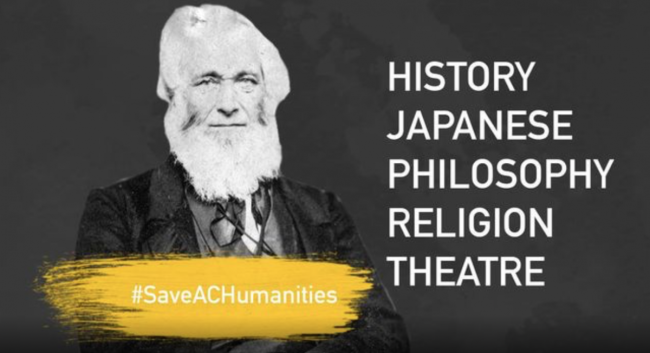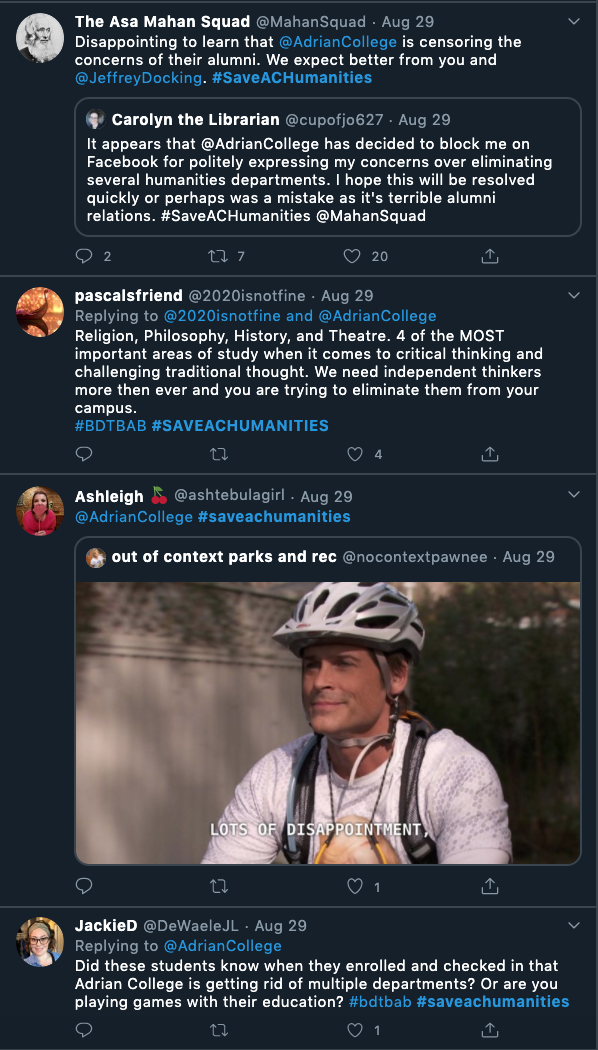You have /5 articles left.
Sign up for a free account or log in.

The Asa Mahan Squad of Adrian College Alumni
Eleven humanities professors at Adrian College in Michigan recently began their terminal year there, or so they thought. Then the administration rescinded their previously delivered pink slips and promised to find other ways to balance its budget. What changed Adrian’s mind?
Hint: It wasn’t the faculty, which, still fuming about the threatened cuts and other issues, has since voted no confidence in Adrian’s president and dean of academic affairs.
Instead, it was alumni who persuaded Adrian to reverse the cuts -- and not all of the alumni were big names. Several thousand graduates, many of them recent, waged a simple but relentless social media and direct outreach campaign to #SaveACHumanities.
“The outpouring of support for the humanities from alumni and friends of the college made me pause to reconsider my decision,” Jeffrey Docking, Adrian’s president, told Inside Higher Ed last week. "We will use this year to strategize about other ways to support the budget and the humanities without making cuts."
Cutting History, Theater, Philosophy and Religion
Earlier this year, citing a desire to maximize the small, private institution’s budget, Adrian quietly shared with its faculty plans to cut three departments: history, theater and the joint religion, philosophy and leadership unit. The cuts would be effective at the end of the 2020-21, Adrian said. No program faculty members would be retained.
Shocked by the news, the Adrian College Association of Professors, Adrian’s National Education Association-affiliated faculty union, started to push back. Central to its argument was that the affected departments more than paid their faculty’s salaries when counting numbers of majors and the effective price of tuition. Last year, for instance, history had 23 active majors and 14 education majors specializing in social studies, out of about 1,800 total students, according to the union. History has four professors, three tenured and one on the tenure track.
The union also argued that many more students benefit from these programs as minors, participants in extracurricular activities such as theater, and in courses such as biomedical ethics, which relies heavily on philosophy.
“The professors were teaching some 50 classes between them -- while directing three institutes -- at 94 percent capacity,” said Jeffrey Lake, associate professor of biology and union vice president. Noting that the college eventually referred to these departments as “underperforming” in a news release, Lake said, “Do underperforming departments have 94 percent of seats full? Clearly, we didn’t think so.”
Lake added, “We thought this was a kind of penny-wise, pound-foolish decision that was going to lose more money in terms of students than if you pay these faculty.” While there’s always a chance that students who wanted to major in history, theater or philosophy would have come to Adrian in the absence of those programs anyway and found other majors, he said, there’s also a chance they wouldn’t have come at all.
Adrian has countered that no incoming student intended to major in some of these programs.
Even so, union leaders and other faculty members asked how could Adrian remain a liberal arts college without philosophy or history. Similarly, they asked how Adrian could claim to follow the United Methodist tradition sans a religion department.
Enter COVID-19
That was in February, just before COVID-19 became campus priority No. 1. The cuts understandably took a back seat from March through summer, when professors finally had a chance to look up from their Zoom screens again.
But renewed attempts at persuading the administration against the cuts proved unsuccessful. The 11 affected faculty members received official layoff notices in late August, as did one of three full-time librarians and a full-time, non-tenure-track professor of Japanese.
By then, with no public announcement from the college, professors started letting students know that some of their majors would be cut, and that some of their professors were starting their final year at Adrian.
Driving home this reality was the fact that seven professors were already gone. When the college announced the intended cuts in February, it also said it was eliminating some full-time, non-tenure-track professors -- including three who developed and administered the college’s two-course freshman core curriculum. Because those professors were not tenured, they were not contractually guaranteed advance notice and left Adrian at the end of last term.
Disturbed by the news, students and alumni took matters into their own hands -- or, more precisely, their thumbs and keyboards.
The Asa Mahan Squad
Some of them formed a closed Facebook group called The Asa Mahan Squad, named after Adrian’s first president, a Methodist minister.
“This group is by, and for, anyone in the Adrian College community who wishes to bring attention to the divisive plan to get rid of the History, Theater, Philosophy, Japanese, and Religion departments at the end of this next school year (2020-2021),” says the description for the squad, which now has 2,400 members.
 The group published a press release and developed hashtags for various social media platforms, including #SaveACHumanities on Twitter. Then they started to blast the college. Along with social media posts shaming Adrian for considering getting rid of beloved programs and professors, alumni also wrote letters and posts about how much the threatened programs meant to them.
The group published a press release and developed hashtags for various social media platforms, including #SaveACHumanities on Twitter. Then they started to blast the college. Along with social media posts shaming Adrian for considering getting rid of beloved programs and professors, alumni also wrote letters and posts about how much the threatened programs meant to them.
Some also organized a petition to Docking and Adrian’s Board of Trustees.
The “Adrian Community deserves better than these decisions,” the petition said. “Simply put, as a dedicated body of alumni, we cannot sit idly by and allow Adrian College to become a shell of itself, consigned to a corporate-style, cookie-cutter education. We all took courses in these departments and with these professors, and we cannot emphasize enough the impact they have had on establishing who we are as some of the most responsible, ethical, engaged citizens of our broader society.”
In response to some of the criticism, Adrian released a statement saying that considering “changing, eliminating or reimagining underperforming departments and then reshaping them and revitalizing the disciplines into a more efficient and effective departmental organizational structure is not ‘abandoning the liberal arts’ or ‘eliminating the humanities.’”
Adrian’s “hope would be that none of these majors, classes or departments will be eliminated,” it said. Yet the college “and nearly every institution throughout the country needs to look at efficiencies that can make college more affordable for the next 100 years.”
The Asa Mahan Squad didn’t back down, even as some members reported being blocked by the college on social media.
‘Passionate Input’
Several days later, Docking wrote to the campus, saying that he’d received a “significant amount of feedback from alumni, faculty, staff and friends of the college” about the cuts, which was “overwhelmingly in support of the “continuation of the majors and minors in these departments and the need to keep the liberal arts at the center of all we do as an institution.”
“As I read the passionate input that was sent to me or posted online, I tried to remain open-minded and cognizant of the cherished traditions that define Adrian College, and the value of a well-rounded education during these challenging times in America,” Docking continued. “I’ve also tried to take a step back and ask what is in the long-term interest of this venerable institution which, as we all know, has stood for 161 years.”
With all of that in mind, Docking said he’d rescinded the layoff notices to department faculty and “we will look for other ways to manage the budget in the year ahead.”
In response, the Asa Mahan Squad released a note saying members were “cautiously optimistic” about the news -- and that they were still waiting to hear about the fate of the non-tenure-track librarian and instructor of Japanese.
“The Asa Mahan Squad is looking forward to working with the college administration to meet our joint goals of keeping alive AC humanities and ensuring the college’s future success,” Ashley Falcon, a 2012 graduate in political science, said in the statement. “We must continue this momentum and make deeper changes in the next months or even years.”
Lake, of the faculty union, said that “while we of course want to see as strong a voice for faculty as possible,” professors credit alumni “for being able to influence the administration” and for being “so utterly invested in the success of our institution.”
“Also to their great credit, they’ve stayed active since the rescission order, and want to continue to be a positive, contributing voice as to where the institutions goes,” Lake said of alumni. “These aren’t long-term donors and trustees, they’re younger, new blood -- relatively recent alumni and in most cases aren’t five-, six-, seven-figure donors. But they’re folks who could be that in 10 to 20 years.”
Jennifer McNabb, an Adrian alumna and squad member who is now chair of history at the University of Northern Iowa, said she wasn’t aware when she joined the cause in August that the layoffs were in the works before the pandemic, and that alumni were generally united in their “efforts to understand what was happening and why.” Their greatest concern, she said, beyond the potential loss of “vital programs for students, was the administration's failure to produce data publicly about the metrics used to identify these majors and faculty for elimination.”
McNabb said Adrian alumni will continue to advocate for their majors, as will those who minored in the threatened programs "or simply took a class that changed the way they thought.”
“We’re all living artifacts of why culture, languages and the humanities matter in higher ed, and we want the thing that drew us to Adrian and still draws students there -- the liberal arts tradition -- to continue to be central to the college's identity.”
No Confidence
While that tradition is safe for now, Adrian’s faculty remains disturbed that it was threatened so suddenly, and without crystal-clear reasoning. Professors also are concerned about Adrian’s fiscal health, which Forbes last year graded D, and fourth from the bottom on a list of 933 private, nonprofit colleges. They continue to question the college’s decision to launch an esports program this fall, even as it planned to cut academics.
Citing those issues, among others, Adrian’s faculty -- separately from the union -- this month voted no confidence in Docking, the college president, and Andrea Milner, dean of academic affairs. Tallies for each vote were not made public, as per campus faculty governance rules. Antonis Coumoundouros, faculty president and chair of philosophy, did not respond to a request for comment. But the no-confidence motions generally question Docking's and Milner's leadership style and decision making.
Docking wrote a book in 2015 called Crisis in Higher Education: A Plan to Save Small Liberal Arts Colleges in America. It promotes doubling enrollment by investing in co-curricular and academic programs as well as housing and facilities. At Adrian, Docking has increased enrollment, to record levels, and introduced many new extracurricular programs and facilities, such as crew and a new boathouse. Yet faculty members say they haven't seen those gains and investments pay off in terms of academics or certain financial stability metrics.
“The allegations here are lack of communication, lack of transparency and essentially a failure of fiscal leadership,” said Keith McCleary, a longtime professor of chemistry at Adrian. Docking’s theory, he continued, is “bring in revenue and then that will pay for everything. But the problem with that is when you bring in students at an increasingly high discount rate, the law of diminishing returns applies.”
McCleary added, “I think we have almost as many full-time coaches as we have tenured faculty.”
Two days prior to the planned vote about Docking and Milner, the college’s Board of Trustees sent a letter to the faculty expressing its “100 percent” support for both. “We have been incredibly happy with their work at Adrian,” the board said. “This support is without equivocation, and this will not change, regardless of the outcome of your vote.”
Regarding the vote, Docking said he hadn’t received “anything official from the faculty indicating that I lost a vote of no confidence. The trustees have not received anything, either.”
Docking also said that “no one from the faculty has tried to talk to the trustees or me about specific concerns they have with the administration.”
Not all professors agree with the vote. Scott Westfall, assistant professor of sport management, wrote a letter to the local Daily Telegram, calling the motions “reckless and undignified” and “embarrassing.”
Since Docking’s arrival, Adrian’s enrollment “has swelled from 840 to 1,865; the average incoming freshman [grade point average] has increased from 2.82 to 3.29; full-time faculty has grown from 56 to 97, and the school’s endowment has expanded from $25.2 million to $60.4 million,” Westfall wrote. Athletic programs tripled, from 16 to 48 teams, he continued, “and full-time coaches have increased from 8 to 63. AC’s outdated classrooms and off-campus (rented) sports fields have been replaced with state-of-the-art learning centers and some of the top athletic facilities in NCAA Division III.”
Westfall challenged Docking's “staunchest” critics to find “any institution across America that has undergone more growth and positive change over the last 15 years.”
Lake said that Docking has “widely touted his sports-based model for recruitment and there is no doubt about it that this model has been successful in bringing in more students. But while it works, it comes with some costs. From the faculty perspective, we focus on the academic side of things so, unsurprisingly, we’re interested in that.”
Lake also said that the faculty union agreed to cut most professors’ salaries by about 5 percent and trim retirement and health-care benefits for the summer, to help the college offset COVID-19-related losses.
Preserving the Liberal Arts
“We recognize these are hard times for higher ed, and we’re ready to step up and help out,” Lake said. At the same time, many of Adrian's professors sought out jobs there precisely because of its liberal arts orientation, “and know the importance of getting an education beyond training in your major and being well-rounded.”
Even if things remain internally rocky at Adrian, the Asa Mahan Squad's success has energized alumni of other institutions fighting for endangered programs.
Canisius College, a Jesuit college in New York State, for instance, announced plans to eliminate around 25 faculty positions, most of them tenured, citing a COVID-19-related budget crunch. Nine programs pegged for elimination include classics, fine arts, physics and religion studies. In response, nearly 6,000 people have signed a Change.org petition opposing the layoffs, and a closed Facebook group for alumni and allies has more than 800 members. A group called Concerned International Scholars also posted a lengthy criticism of Canisius's plan on The Professor Is In's blog. Meanwhile, Canisius announced the appointment of four new assistant professors and a dean.
The American Association of University Professors wrote to Canisius president John Hurley last week, saying that the college’s actions, “reportedly effected without any meaningful faculty participation,” raise “significant issues of faculty governance as well as of basic academic freedom and tenure.”
John J. Hurley, president of Canisius, said Monday that the college "never confirmed the number of 25 faculty positions because we were in the midst of discussions with faculty and departments." The final number of affected professors is now 22, he said, "and we have reached resolutions with more than two-thirds of those."
Steven Seegel, a Canisius alumnus and professor of history at the University of Northern Colorado who has been campaigning against the cuts, called the Adrian story "very inspiring, not just to Canisius faculty."
Hurley said there are "some alumni" who have expressed concerns about the situation, "but many more who understand what the college is doing and why."









